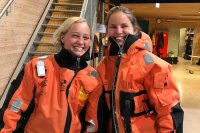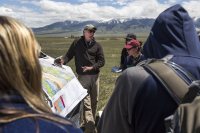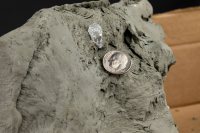
Summer Student Work: Getting to the core of things
David Harning ’13 doesn’t mind playing in the dirt. This summer, he is studying core samples of lake sediment for his geology thesis.
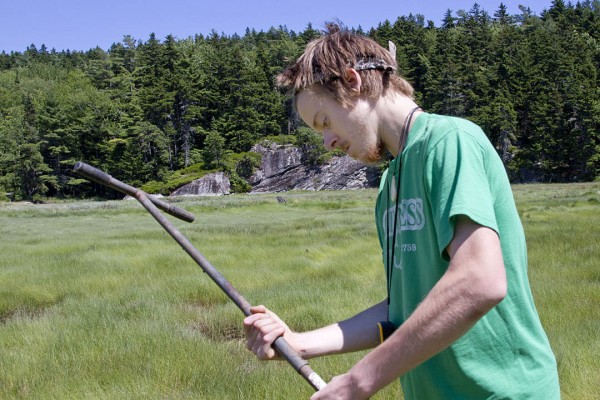
David Harning ’13 is one of dozens of students conducting research on campus this summer. Photograph by Phyllis Graber Jensen/Bates College.
Name: David Harning ’13
Hometown: Rye, N.H.
Major: Geology; German minor
Research adviser: Beverly Johnson, associate professor of geology
Research funding: Hoffman Research Fellowship, supporting full-time summer research in any discipline through the Maximillian E. and Marion O. Hoffman Foundation
1. Say you’re sharing an elevator with a law clerk who’s curious about your research. How would you describe it?
Basically, I’m looking at sediment cores collected from the bottom of a lake. The geochemistry of these sediments reflect environmental and climate change. This particular lake is in New Zealand, and my core samples span the past 400 to 500 years (about 30 centimeters of material). Specifically, I’m analyzing the nutrient content and lake productivity in the layers of lake sediments. Through those analyses we can — hopefully — see changes over time. Those changes could be related to a number of things, such as climate change or human impacts in the watershed. It’s really a paleo-environment reconstruction project — seeing how the lake’s water quality and productivity has changed over 500 years.
2. What made you decide to study dirt at the bottom of a lake in New Zealand?
I went to New Zealand this past spring because I was looking for another study-abroad experience. I had already gone to Austria my sophomore year. I also needed to get some geology credits, and since I love the outdoors, New Zealand seemed like a logical fit. From there, the project just kind of fell in my lap. While at the University of Otago, I met a new professor who needed students for research; it seemed like a good fit. Before I left, I took samples to bring back to Bates.
3. What do you enjoy most about the research?
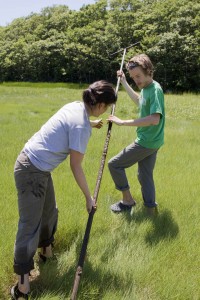
Harning, right, assists Margaret Pickoff ’13, left, at the Bates-Morse Mountain Conservation Area. Photograph by Phyllis Graber Jensen/Bates College
I’m looking forward to the results. That’s what is driving me through the lab work, which can be tedious and monotonous. I think it’s neat being able to see how the environment in New Zealand has changed in the last half a millenium just by looking, essentially, at the dirt in your hands.
4. What’s the best part of working with your adviser, Beverly Johnson? The most challenging?
She’s very accessible. Whenever I need her, even if she’s not in her office, I’ll shoot her an email and she responds really quickly. I’m never left feeling stranded or on my own. My work is largely independent, but obviously you need some guidance and clarification along the way.
I don’t think she has a worst part — yet!
5. How does this summer research connect to your course work?
It’s the basis for my thesis, which is a requirement for most majors. Also, the summer research is helping me get a month of this lab work out of the way. Now I won’t have to do it simultaneously with four courses over each of the fall and winter semesters.
6. Best part of being on campus in the summer?
It’s absolutely gorgeous! I love it. You get a completely different vibe. Walking around, especially in the morning, it’s quiet and pristine. You can go down to the Puddle, and it’s just so peaceful there. I’m really glad to be here this summer.
